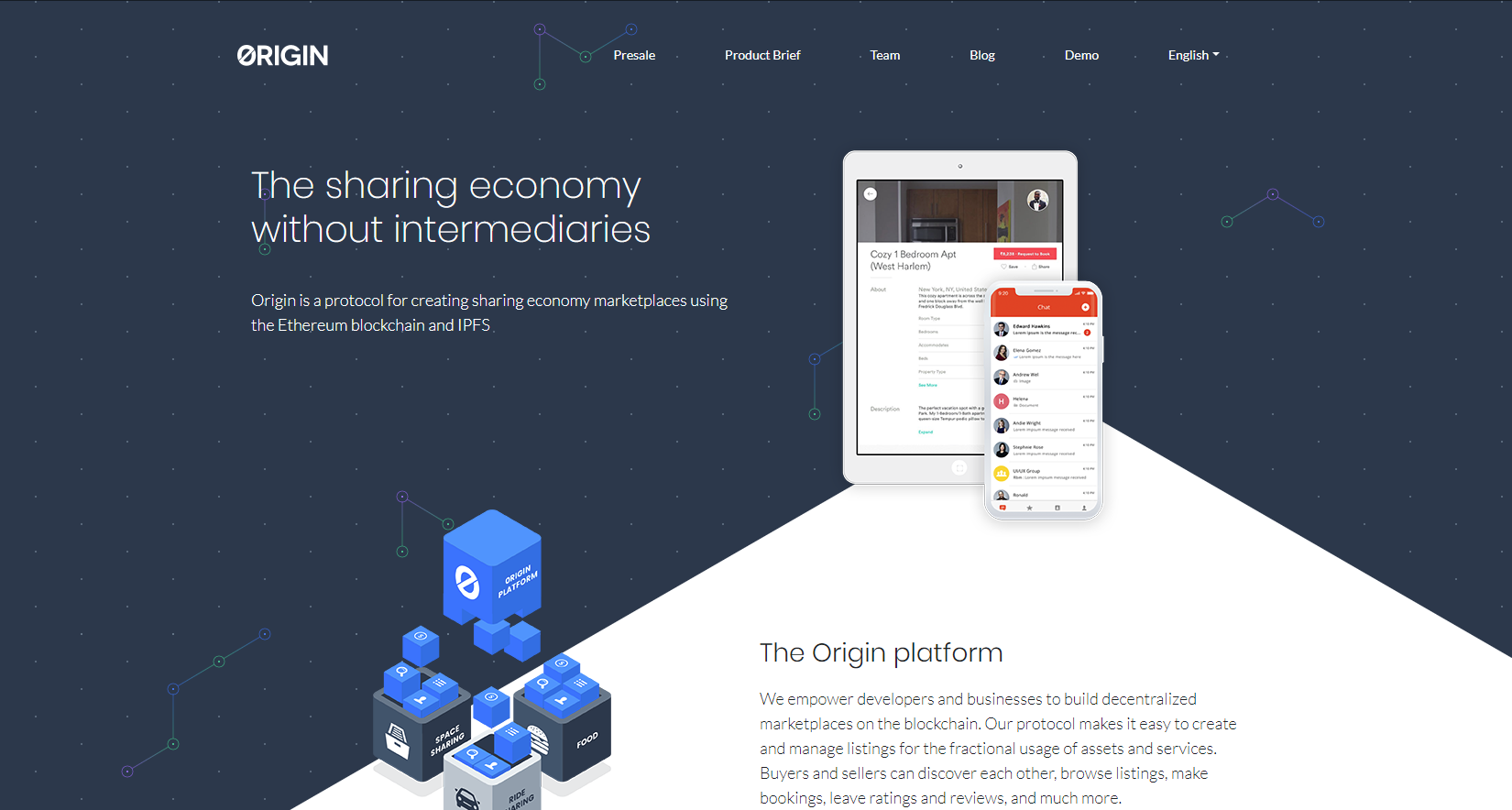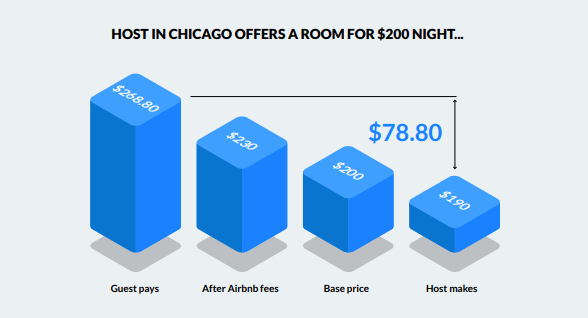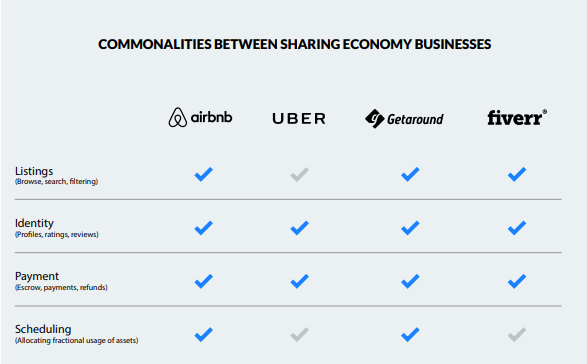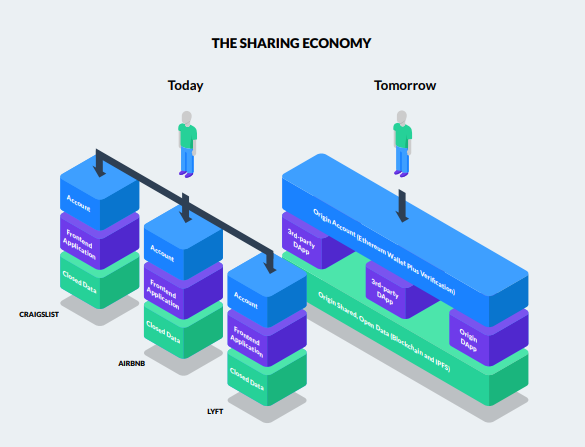Origin Protocol Review: A Decentralized Marketplace for the Shared Economy
| Coin Name | Origin |
| Coin Ticker | ORIGIN |
| Token Type | ERC20 |
| Total Tokens | TBA |
| Website URL | https://www.originprotocol.com/en |
| White Paper URL | https://www.originprotocol.com/static/docs/whitepaper_v3.pdf |
Origin Protocol’s goal is to deliver a decentralized marketplace on the blockchain for participants of the shared economy. Origin will allow transactions between participants in the shared economy and major players such as Airbnb, Fiverr, TaskRabbit, Uber and Upwork without the need for an intermediary.
Article Summary
- The Team and Idea
- How Origin Protocol Works
- The Origin Tokens
- The Origin Platform
- The ICO

The Idea and the Team Behind Origin Protocol
The shared economy, or gig economy, is quickly gaining more popularity, with more and more marketplaces such as Uber, Airbnb, Doordash, GetAround, and TaskRabbit. Transactions from these marketplaces are expected to hit $335 billion by 2025. The platform fees from these transactions are calculated to be around $40 billion. Origin Protocol aims to eliminate the intermediaries involved in the share economy and replace them with new marketplaces for buying and selling assets and services.

Current shared economy marketplaces incur high fees for sellers
In addition to high transaction fees, Origin Protocol sees other disadvantages in the current shared economy marketplace. For instance, current marketplaces do not allow users to own and control their data. Origin Protocol, on the other hand, views open data as necessary for trust and transparency. Another disadvantage is that current marketplaces have arbitrary rules and censorship and can easily ban users from using accounts for any reason whatsoever.
In addition, the success of current giant shared economy platforms such as Uber and Upwork may decrease their incentive for innovation. Origin Protocol seeks to create a technology and community that lowers these fees, increases innovation, encourages the free exchange of customer and transaction data, and decreases censorship and unnecessary regulation.
This is especially pertinent in light of the fact that Uber and Airbnb have been banned or heavily regulated in cities all over the world and these companies have banned individuals from ever using their marketplace.

Josh Fraser and Matthew Liu are the co-founders of Origin Protocol, which is based in San Francisco. Fraser founded three venture-backed companies before starting this one. One of his companies, Torbit, was acquired by Walmart Labs in 2013. Liu was the third product manager at YouTube and part of the company’s acquisition by Google in 2006.
Although the team is passionate about improving the platforms associated with the shared economy, Liu admits that Ethereum’s infrastructure isn’t ready to handle a high-volume market such as Airbnb. “I think the more complex scenarios like Uber are not going to be the ones that emerge at the beginning,” Liu said to Coindesk. “We’ll probably be surprised.” Instead, he predicts smaller projects will emerge. In acknowledgement of this, the team is currently considering building a product around the concept of selling coding or design.
How Origin Protocol Works
Origin Protocol encourages both developers and businesses to build decentralized marketplaces on the blockchain. Using the platform, users can easily create and manage listings while bypassing usual high fees of shared economy platforms (such as Uber and Upwork). At the same time, the platform serves as a community in which buyers and sellers can easily see offerings, listings, make bookings, and leave ratings and reviews for one another.
The protocol enables buyers and sellers to execute transactions in a trustless and distributed fashion while also creating standards of self-government and self-regulation. “Trustless” means that buyers and sellers are free to transact with a pseudonym if both consent to it.
Identities can instead be verified either through public keys, which can then be used in their social media accounts. The platform will also allow verifications from trusted third-parties.
The decentralized platform is based on the Ethereum blockchain and Interplanetary File System (IPFS).
The Origin Tokens
Origin tokens serve three functions:
- creating both negative and positive incentives
- Facilitating buyer/seller transactions of value
- Enabling network governance
Negative and positive incentives are necessary for effective use of the platform. Different incentives must be created, for instance, to prevent spam and fraudulent accounts while at the same time encouraging early adopters to add value to the network.
Mandating the deposit of a few tokens before creating user profiles or accounts will discourage the creation of spam or fraudulent accounts. In addition, self-moderation of the network will be encouraged. Users can report suspecting content by depositing an equivalent number of tokens as the original poster.
The community will vote to decide which poster is trustworthy (the winner), and as an incentive for self-moderation the forfeited deposits from the loser will be shared between the community members and the winner.
Origin tokens can also facilitate the purchase of goods and services. A purchaser of a marketing service, for example, will need to transfer an Origin token to the smart contract, where it will be held until the marketing service is completed.
Once the service is completed, the smart contract returns the token back to the supplier. Transactions will most likely take place using Ether but will also support other ERC20 tokens. In the future, Origin plans to enable conversions for fiat currencies and Ethereum.
Finally, tokens will also be used to make platform decisions on important subjects such as feature enhancements, code updates, and policy changes.
The Platform
Origin Protocol’s platform is based on three simple goals:
- Avoiding Single Points of Failure (SPOF)
- Avoid reinventing the wheel
- Balance performance and computer efficiency with user experience
The platform is based on the Ethereum platform and the Interplanetary File System (IPFS). All data, such as pricing and availability, are stored directly on the blockchain, while metadata such as descriptions, images, reputation and reviews are stored on the IPFS. Since storage on the IPFS network is significantly less expensive than storage on the blockchain, this setup enables scaling while at the same time minimizing costs.

Suppliers connect to the platform with a decentralized application, or a DApp. The Origin DApp is an open-sourced HTML and JavaScript application that connects suppliers with the Ethereum network, IPFS network and preferred indexing server. The DApp validates the data and pushes it to the IPFS network. When a listing is created (a worker offers their service), it creates a unique IPFS content hash to reference the data, which is then stored on the Ethereum blockchain.
Since major advances are expected in both Ethereum and IPFS in the next few years, the Origin platform will continue to be a work in progress.
The ICO
Interest in the coin is high and the future looks promising. “Partners are building on Origin because they realize they can get to market sooner and we can share network effects by working together,” Fraser said to Bitcoin Magazine.
Bee Token, SnagRide, JOLYY, Acquaint, Aworker, BlockFood, Edgecoin and ODEM have already announced their intent to build on the Origin platform. More partners will join later this year.
In February of this year the company announced that fake websites were announcing Origin’s token sale. The team is considering building a launch plan that uses tokens to award early adopters – such as a refund of tokens after completion of transactions.
The real Origin Protocol ICO is scheduled to launch in the third quarter of 2018. Stay tuned for an announcement of their token distribution on their official website.
